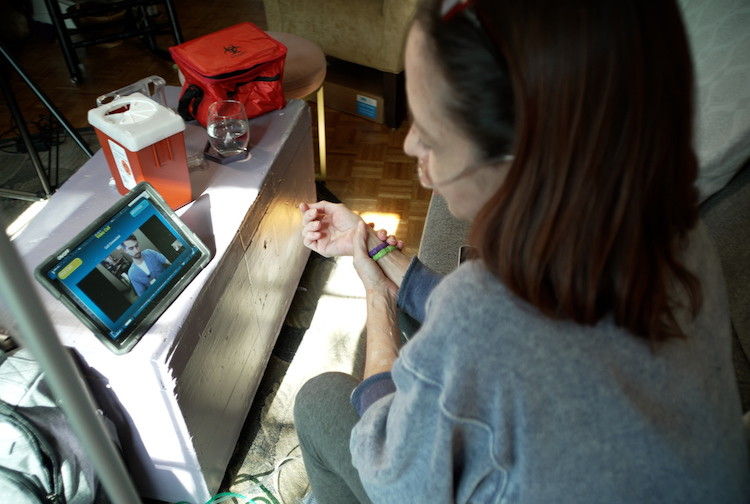
Meeting the needs of patients from the comfort of their home
Launched in January 2023, VCU Health’s Hospital at Home program is bringing acute, hospital-level care to the comfort of patient’s homes.
May 04, 2023 Providers are only a call away with VCU Health’s Hospital at Home program, which launched in January 2023. (VCU Enterprise Marketing and Communications)
Providers are only a call away with VCU Health’s Hospital at Home program, which launched in January 2023. (VCU Enterprise Marketing and Communications)
This story was updated May 31, 2024 after VCU Health changed the name of the program from Home Hospital to Hospital at Home.
By Danielle Pierce
Sally Hastentab has been in and out of the hospital since her liver failure diagnosis two years ago. Frequent trips to doctor’s appointments can be taxing for anyone, but especially someone who is immunocompromised, meaning they have a weakened immune system.
“My body is not what it used to be,” Hastentab said. “I’m on the liver transplant list and frequently in and out of the hospital.”
VCU Health patients who would normally have needed to be in a hospital for acute care needs, such as sepsis, congestive heart failure or pneumonia, now have the option to receive the same level of care at home.
During one of her latest hospital visits, Hastentab’s doctors told her about VCU Health’s new Hospital at Home program.
“As soon as the doctors mentioned this program to me, I thought it was a great idea,” Hastentab said. “I knew it would be good for me so that I wouldn't be in the hospital around other people who are sick, being immunocompromised myself, and so that I could have a little bit more peace and quiet to rest and recover.”
Increased need for comprehensive home health care solutions
Over the past several years, the demand has increased for home-based health care solutions. This became especially clear during the COVID-19 pandemic.
“The pandemic brought about a lot of changes in healthcare. For example, the ability to leverage technology and telemedicine to be able to reach out to patients in their homes and community settings,” said Jay Holdren, senior director for VCU Health at Home’s suite of capabilities. “The opportunity arose allowing us to take hospital level care into the home by using virtual health in combination with visits by doctors and nurses and we’ve hit the ground running.”
Technology, such as tablet PCs virtually tethered to a centralized command center on Richmond’s Northside, enables patients with the tools to reach out and connect with a nurse 24 hours a day, seven days a week. Remote monitoring makes Home Hospital possible because the provider team is simply one click away.
“Patients know that they are one buzz away from a nurse who knows them and knows their condition. They are one video encounter from a provider beaming into their home and assessing their condition,” Holdren said.
Knowing that her care team is always that close is reassuring to Hastentab.
“To be honest, I like this better because I don’t have to wait for my nurse,” she said. “All you have to do is dial them up and they're right there to answer questions or for you to do your medications or to turn in your vitals if you need to do it that way. So it's all right there in front of you.”
In addition to around-the-clock remote monitoring, each patient has a dedicated Home Hospital team.
“We have a very comprehensive team supporting our patients in the home setting,” said David Goldberg, M.D., a hospitalist at VCU Health.
Many people think a patient’s care team is just made up of doctors and nurses. But with Hospital at Home, there are a wide array of specialists who work with each patient. There are social workers and care coordinators for each case. Pharmacists play an instrumental part by providing any medication that a patient requires to rest and recover at home. There are also paramedics available to transport medical equipment and an IT team for any technology issues.
All of these people work as a collective unit to ensure that each patient gets the best care possible.
Benefits for both patients and providers
While there are numerous patient benefits from recovering at home, like sleeping in your own bed or being comforted by family or pets, there are also added benefits from a provider perspective.
For example, Holdren says seeing what a patient eats, how they’re sleeping and what support they have at home are important factors for a person’s overall health.
“By visiting patients in their homes, we’re able to see a wide variety of influences and we can begin to address those,” Holdren said. “We’re able to make sure that patients get not only what they need during the hospital stay but we can start to address their needs longitudinally and holistically. And that is powerful.”
Sally Hastentab is part of VCU Health’s Hospital at Home program. As someone who is usually in and out of the hospital frequently, she says being able to recover at home has made “a big difference” for her health. (VCU Enterprise Marketing and Communications)
Recovering at home, instead of in the hospital, has been key for Hastentab. Having her own bed and fresh air has done wonders for her health and comfort.
“Being able to live your life outside of the hospital makes a big difference,” she said. “You recuperate better at home. You can watch whatever you want on TV and you can get up and walk around your house. I just appreciate the opportunity to be here.”




